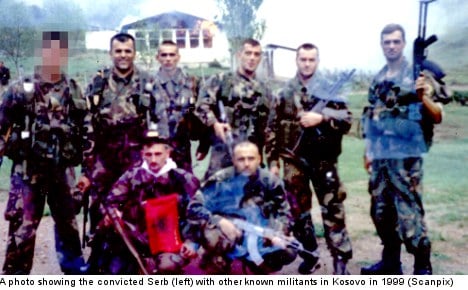“The only explanation is that the court of appeal has thrown out the district court’s ruling,” attorney Bertil Schultz told the TT news agency.
Back in January 2012, Milic Martinovic, a then 34-year-old Serb who had been arrested two years earlier in Sweden, was found guilty of aggravated crimes against humanity, including murder, attempted murder and aggravated arson, all in connection with the massacre, the Stockholm District Court ruled.
He was sentenced to life in prison for his role in a massacre of 40 people in the village of Cuska in Kosovo in 1999.
Martinovic had allegedly been a member of the special PJP police force that entered Cuska on May 14th, 1999 in search of “terrorists.”
Armed and in uniform, he was among the troops who took a large number of people captive, killed 29 of the 40 people murdered there that day, attempted to kill three others, burned down houses and manhandled civilians, the court said.
But on Wednesday, the Svea Court of Appeal ordered Martinovic to be released, leaving the 35-year-old Serb dumbfounded.
According to Schultz, Martinovic didn’t know what to think when a guard opened his cell and said, “You can go now”.
“He’s going home to his family now,” said Schultz.
It remains unclear exactly why the court of appeals elected to have Martinovic released. A formal ruling from the court isn’t expected until December 19th, according to TT.
The 35-year-old has claimed he was never in Cuska where the massacre occurred.
However, Martinovic can be seen in pictures posing with weapons with other considered to be responsible for the massacre.
“Milic Martinovic participated in the operation with the understanding that the aim was to murder and rob civilian Kosovo Albanians,” according to court documents.
Several survivors from the incident travelled to Stockholm to testify during the trial, one of the largest in Swedish legal history.
However, Schultz argued during the trial that the survivor’s testimony may have been politically motivated and clouded by the passage of more than two decades.
Krister Petersson, one of the prosecutors who tried the case said he was “extremely surprised” that Martinovic had been released, but added it’s too early to tell whether or not the case may eventually be taken to Sweden’s Supreme Court (Högsta Domstolen).
Martinovic, whose wife and three children reside in Sweden, was held on remand for an exceptionally long period of time – nearly two years, among the longest of any criminal suspect held in Sweden.
If he is ultimately acquitted by the appeals courts, he may be entitled to claim damages of up to 1.5 million kronor ($266,000) for wrongful imprisonment, according to Britt-Mari Lundberg from the office of the Chancellor of Justice (Justitiekanslern), which acts as an oversight body for the Swedish judicial system.
TT/AFP/The Local



 Please whitelist us to continue reading.
Please whitelist us to continue reading.
Member comments